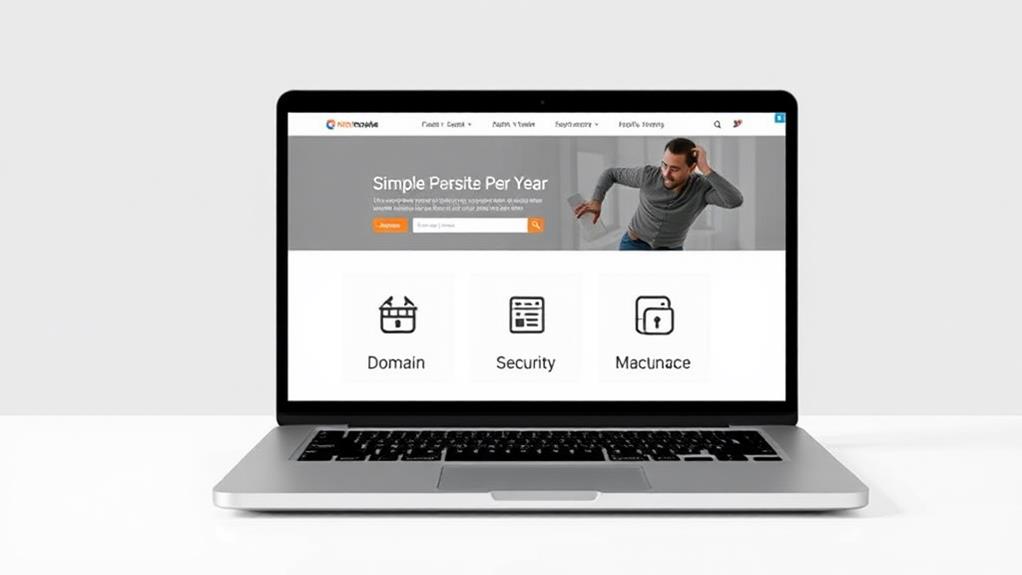Understanding the annual cost implications of a basic website is crucial for effective budget planning. From domain registration to maintenance expenses, each aspect contributes to the overall expenditure. The question lingers: how much does it all add up to? Exploring the breakdown of costs involved in running a website can shed light on the financial commitments required for a successful online presence. Stay tuned to unravel the intricacies of budgeting for a basic website and optimizing financial resources efficiently.
Key Takeaways
- Domain registration: Initial cost plus annual renewal fees.
- Hosting fees: Vary based on provider and plan.
- SSL certificate: Essential for security, renewal costs vary.
- Web design: Price varies with complexity and customization.
- Maintenance: Updates and security measures essential for functionality.
Domain Registration Costs
Domain registration expenses are a vital consideration for establishing an online presence. When choosing a domain for your website, it is essential to factor in not only the initial registration fee but also the registration renewal and potential transfer fees.
Registration renewal fees are the recurring expenses that you will need to pay to maintain ownership of your domain. These fees typically occur on an annual basis and can vary depending on the domain registrar you choose.
Additionally, transfer fees may come into play if you decide to move your domain to a different registrar. It is important to be aware of these potential costs before making a decision to transfer your domain.
Transfer fees can vary between registrars and may involve additional steps to complete the transfer process smoothly.
Understanding the full scope of domain registration expenses, including registration renewal and transfer fees, is vital for budgeting and planning purposes when establishing and maintaining your online presence.
Website Hosting Fees
When pondering the costs linked with maintaining a website, one significant aspect to take into account is website hosting fees. Website hosting fees pertain to the cost of leasing space on a server where all the files and data of a website are stored and made available to users on the internet. These fees can vary depending on the hosting provider, the type of hosting plan chosen, and the specific needs of the website.
Bandwidth limitations are a vital factor to contemplate when selecting a hosting plan. Bandwidth limitations determine the amount of data that can be transferred to and from the website within a specific period. Exceeding these limitations can lead to additional fees or even downtime for the website.
Another essential aspect of website hosting is server reliability. A dependable server ensures that the website is accessible to visitors without experiencing frequent downtime or slow loading times. Opting for a hosting provider with a reputation for server reliability is crucial to maintain a positive user experience on the website.
SSL Certificate Expenses
Considering the foundation of website hosting fees, another significant expense that website owners need to factor into their budget is SSL certificate expenses. SSL certificates are vital security measures that guarantee data encryption between the user's browser and the website server, safeguarding sensitive information from potential cyber threats.
These certificates need to be renewed periodically to maintain their validity and effectiveness, incurring renewal fees that contribute to the overall cost of website ownership. The renewal fees for SSL certificates vary depending on the type of certificate, the level of security required, and the issuing authority.
It's important for website owners to allocate a portion of their budget towards SSL certificate expenses to uphold the security and integrity of their online platform. By investing in SSL certificates and staying up to date with their renewals, website owners demonstrate a commitment to safeguarding user data and maintaining trust with their audience.
Web Design and Development Charges
Crafting a visually attractive and functional website demands a skilled team of web designers and developers who can bring your online vision to life. When it comes to web design and development charges, prices can vary significantly based on the intricacy of the project and the level of customization required. It's crucial to compare prices from different web design agencies to make sure you are getting a fair deal.
The cost of web design and development typically includes factors such as the number of pages, features like e-commerce functionality, responsive design for mobile compatibility, and the integration of multimedia elements. Customization options, such as unique layouts, color schemes, and interactive elements, can also impact the overall price.
Before committing to a web design and development package, ensure to discuss your specific requirements with the agency to get a detailed quote.
Maintenance and Updates Costs
When maintaining a website, regular tasks such as updating plugins, backing up data, and monitoring security are necessary to guarantee peak performance and security. Updates play a vital role in fixing bugs, enhancing functionality, and keeping up with the latest web standards.
Considering the cost impacts of outsourcing maintenance or investing in automated tools is essential for effectively managing website maintenance expenses.
Regular Maintenance Tasks
Regular maintenance tasks for a website are necessary for ensuring its functionality, security, and overall performance. Security measures play a significant role in safeguarding the website from cyber threats and unauthorized access. Regularly updating software, plugins, and security patches is important to prevent vulnerabilities that could be exploited by hackers. Implementing SSL certificates, firewalls, and regular security audits are also essential parts of maintaining a secure website environment.
Content management is another key aspect of regular maintenance tasks. Ensuring that the website's content is up to date, relevant, and engaging is vital for attracting and retaining visitors. Regularly reviewing and updating content, optimizing images and videos for faster loading times, and monitoring user engagement are all crucial content management tasks that contribute to the overall success of the website.
Importance of Updates
Maintaining regular updates for a website is essential in preserving its functionality, security, and overall performance. Security measures like software updates, security patches, and firewall maintenance are crucial to safeguard the website from vulnerabilities and cyber threats. Regular updates also guarantee that the website's content management system, plugins, and themes are up to date, reducing the risk of security breaches or compatibility issues.
Neglecting to update a website regularly can leave it vulnerable to security risks, potentially resulting in data breaches, malware infections, or even complete website shutdowns. Outdated software and plugins are common targets for cyber attacks, underscoring the importance of staying current with updates.
Aside from security benefits, routine updates can enhance the website's performance, speed, and user experience. By keeping all aspects of the website up to date, businesses can ensure that their online presence remains secure, reliable, and optimized for visitors.
Cost Considerations for Maintenance
Maintaining a website involves various ongoing expenses, with a substantial portion allocated to maintenance and updates costs. When considering the cost [IMPLICATIONS] of maintaining a website, it is [ESSENTIAL] to take into account the following key factors:
1. Time commitment: Regular maintenance and updates require a [SIGNIFICANT] time investment. Tasks such as monitoring website performance, updating content, and [ENSURING] security measures are up to date can be time-consuming. Website owners need to allocate [ADEQUATE] time to address these maintenance needs effectively.
2. Skill level: The level of [EXPERTISE] required for website maintenance can impact costs. Depending on the [COMPLEXITY] of the updates needed, website owners may need to hire professionals with specific skills, such as web development or cybersecurity, to [OPTIMIZE] the website functions [EFFICIENTLY].
Alternatively, investing in training to [IMPROVE] personal skill levels can also be a cost consideration.
3. Software and tools: Utilizing software and tools for website maintenance can incur additional costs. These may include subscription fees for security plugins, content management systems, or website monitoring services. Evaluating the necessity and cost-effectiveness of these tools is [ESSENTIAL] in managing maintenance expenses [EFFECTIVELY].
Marketing and Promotion Expenses
A fundamental part of managing a website is allocating resources towards marketing and promotion costs. These expenses are vital for increasing visibility, driving traffic, and ultimately achieving the desired goals for the website.
Digital advertising is a key element of marketing expenditures, covering various strategies such as pay-per-click (PPC) campaigns, display ads, and search engine marketing. Investing in digital advertising helps reach a wider audience and target specific demographics effectively.
Social media marketing is another essential cost, involving the creation of engaging content, running targeted ads, and interacting with followers on platforms like Facebook, Instagram, and Twitter. Effective social media marketing can improve brand awareness, drive website traffic, and nurture customer engagement.
Allocating a budget towards these marketing and promotion costs is necessary for maximizing the website's reach and impact in the competitive online environment.
Additional Plugins and Tools Fees
For website owners, incorporating extra plugins and tools often comes with a price that is important for enhancing functionality and user experience. When considering these fees, it's essential to account for customization options and support services to guarantee your website operates at its best. Here are three key points to keep in mind:
- Customization Options: Some plugins and tools may offer basic features for free but charge for more advanced customization choices. These tailored features can help align your website more closely with your brand identity and specific needs.
- Support Services: Many plugins and tools require ongoing support services, either through subscriptions or one-time payments. This assistance ensures that any issues or updates are promptly addressed, preventing disruptions to your website's performance.
- Cost-Effective Solutions: While extra plugins and tools incur expenses, selecting the right ones can lead to cost-efficient solutions in the long run by streamlining processes and enhancing user engagement.
Total Annual Budget Calculation
When it comes to managing the budget for a website, a detailed breakdown analysis is essential. By examining each cost component, it becomes easier to identify areas where cost efficiency strategies can be implemented.
Grasping the total annual budget calculation is vital for optimizing website expenses and ensuring financial sustainability.
Budget Breakdown Analysis
To adequately assess the budget breakdown for maintaining a website over the course of a year, it is imperative to meticulously analyze each component contributing to the total annual cost. When considering the expenses associated with running a website, there are several key factors to take into account:
- Pricing Comparison: Conducting a thorough pricing comparison among different web hosting providers, domain registrars, and website builders can help identify the most cost-effective options for your specific needs.
- Cost Saving Tips: Implementing cost-saving strategies such as opting for annual billing cycles, using open-source platforms, and avoiding unnecessary add-ons can notably reduce the overall expenditure on website maintenance.
- Content Management System (CMS) Fees: Factor in any fees associated with using a particular CMS, as these costs can vary depending on the platform chosen and the additional features required.
Cost Efficiency Strategies
A thorough examination of cost efficiency strategies is crucial in devising an accurate total annual budget calculation for maintaining a website. Implementing efficiency tips and cost-saving strategies can have a significant impact on the overall expenses. Here are some key strategies to optimize costs:
| Efficiency Pointers | Economical Strategies |
|---|---|
| Routine Website Audits | Outsourcing Non-Essential Tasks |
| Optimizing Hosting Plans | Utilizing Open-Source Software |
| Content Management System Evaluations | Implementing Automated Processes |
Routine website audits help identify areas for improvement and potential cost reductions. Optimizing hosting plans can ensure you're getting the best value for your hosting expenses. Evaluating your content management system can reveal opportunities to streamline content creation processes. Outsourcing non-essential tasks can be cost-effective compared to hiring full-time employees. Utilizing open-source software can save on licensing fees. Implementing automated processes can reduce manual labor costs. By incorporating these efficiency pointers and cost-saving strategies, you can maintain a high-quality website within a reasonable budget.
Frequently Asked Questions
Can I Use a Free Domain for My Website?
When considering free domain options for a website, it's vital to understand that while some platforms offer complimentary domain registration, there may be limitations. Free domains often come with restrictions on customization and branding. Additionally, users should be aware that these options may lack the same level of professionalism as paid domain registration.
It's important to weigh the benefits of a free domain against the potential drawbacks and consider investing in a paid domain for a more professional online presence.
Are There Any Hidden Costs in Website Hosting?
When considering website hosting, it is key to account for potential hidden costs beyond the upfront fees. These may include additional charges for bandwidth usage, SSL certificates, backup services, security features, and technical support. Maintenance costs for updates, plugins, and content management can also accumulate over time.
Grasping the full scope of hosting fees and maintenance costs is vital for budgeting and ensuring a seamless online presence.
Do I Need an SSL Certificate for a Small Website?
For a small website, having an SSL certificate is essential for security and trust. SSL encrypts data transferred between users and the website, safeguarding sensitive information like login credentials. It also helps in boosting search engine rankings and user confidence.
While it may add a bit to the cost, the benefits of SSL significance for small website security far outweigh the investment. Guarantee your website is secure and trustworthy by investing in an SSL certificate.
How Often Should I Update My Website?
Regular content refresh is essential for website relevancy. Updating your website frequently not only engages visitors but also boosts SEO optimization. Studies show that websites updating their content at least once a week see a noteworthy increase in traffic and user engagement.
What Are the Best Marketing Strategies for a New Website?
When launching a new website, effective marketing strategies include leveraging social media marketing to engage with a broader audience and build brand awareness. Additionally, implementing targeted email campaigns can help drive traffic and nurture leads. By strategically utilizing these channels, businesses can increase visibility, cultivate customer relationships, and ultimately drive conversions. It is essential to monitor and analyze the performance of these strategies to optimize results and continually refine the marketing approach.
Conclusion
In conclusion, the cost of a basic website per year can vary considerably depending on various factors such as domain registration, hosting, SSL certificates, design and development, maintenance, marketing, and additional expenses. Despite efforts to carefully manage the budget, the irony lies in the unpredictable nature of online costs, making it challenging to accurately estimate the total annual expenses for maintaining a website.






